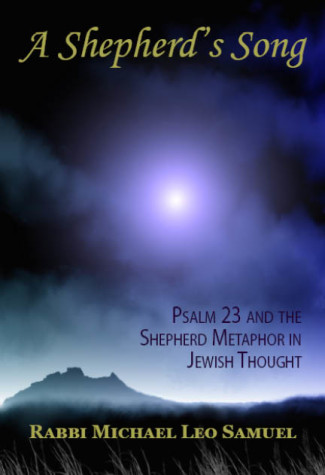In several weeks, Jews throughout the world will assemble in synagogues and entreat God in the most persuasive terms to forgive their sins. The entire prayer-book, like the Bible itself, is filled with passages that suggest God is possessed of a body and emotions. In fact, Samuel notes, “Semantically speaking, even the idea of ‘praying to God’ implies spatial concepts…” (p. 158). Similarly, the book of Psalms entreats God, “Give ear, O Shepherd of Israel, who leads Joseph like a flock” (Ps. 80:1). The shepherd metaphor in this verse is a basis of the piyyutim, “Our God and God of our fathers, forgive us… we are Your flock and You are our Shepherd….” Yet many worshippers may this find language ineffectual due to centuries of anti-anthropomorphic argumentation.
Rabbi Samuel’s work is a meticulous outpouring that we should reconsider our understanding of God. He makes an impassioned plea that if we want to have a meaningful and mature religious identity, it is essential to embrace how traditional sources characterize God. He argues, “Laypeople and rabbis alike have difficulty accepting the reality of God as a personal Presence in their lives” (p. 28). In a personal conversation with the author, Rabbi Samuel explained to me, “If you don’t have a personal connection with God, your prayer might as well be a letter that starts with the words, ‘To Whom It May Concern.’”
Many Jews today are inculcated to say that anthropomorphic locutions are all metaphors, and should not be interpreted literally. After all, the ancient pagans believed that the gods all possessed bodies and emotions, while we sophisticates have evolved beyond such childish beliefs. Their gods are many, our God is one. Their gods are corporeal, our God is beyond time and space. Their gods are capricious and petty, our God is merciful and just. But do we feel any emotional connection when rattling off these catechisms?
Samuel warns that when dry understandings replace a personal connection with God, the result is spiritual isolation: “Ever since the time of Aristotle, Western philosophy frequently portrays God as an Outside Prime Mover, standing apart from the processes of the universe, with no personal interest in the world’s welfare” (p. 91). He argues that anti-anthropomorphism risks creating a spiritual malaise, and if taken in its most extreme form, will likely lead to religious indifference or atheism. Samuel contrasts the biblical phrasing, “I am the Lord your God,” with the Greeks, who “never had a personal name for the One God” (p. 114). This is not to suggest that Samuel is a philosophical Luddite; he possesses a facile ability to quote a range of Jewish, Greek, Christian, and modern authorities, from Homer to Wittgenstein; yet Samuel extracts from the ancients and moderns the importance of finding renewed meaning in descriptions of God that have been downplayed as “metaphor.”
While it is an important development that today’s Jews have learned to move beyond the idea of a corporeal God, Samuel argues that sometimes we are unable to take the next step, and ascribe real meaning to metaphorical language. Anthropomorphic language pervades the Bible, Midrashim, Talmud, and all subsequent literature; when we dismiss this huge corpus of literature as inconsequential, we risk slipping into the bleak existential abyss. Samuel argues that preserving metaphor is necessary for a spiritually healthy society, since metaphor “does not seek to explain the empirical facts about the natural world. Instead, it aims to disclose how the sacred meaning is present within the natural observable universe” (p. 106).
The worshipper must proceed to find meaning within the anthropomorphic language. Signs, symbols, and metaphors have emotional and cognitive significance, and Samuel argues that the shepherd is a “root metaphor” (p. 67), which demonstrates the connection of the collective past to the life of the individual in the present. The parameters of this metaphor are nuanced and rich, and Samuel is not afraid to draw on diverse sources who offer their interpretations of this fundamental image. For example, he quotes from Philo of Alexandria that “When a flock lacks a shepherd to govern it, it is inevitable the flock will meet a disastrous end because it is too helpless to repel whatever might be injurious to it” (p. 196), an idea which is remarkably similar to the liturgical sarnu mi-mitzvotekha u-mi-mishpatekha ha-tovim ve-lo shaveh lanu, “we have strayed from Your commandments and your good ordinances, and it has not been worthwhile for us.”
Samuel also supplies other attributes of shepherding, which transform the shepherd archetype from empty rhetoric to a meaningful symbol. For example, he explains that a shepherd “is dedicated to the careful management of the flock,” which indicates that God has an overall plan for humanity. A shepherd must have “constant attention and mindfulness,” which means God has perpetual concern for mankind. And shepherding “is a solitary profession” (p. 259), which alludes to God’s unity. These themes are conspicuously similar to the penitential ideas of malkhiyyot, zikhronot, and shofarot.
Samuel is also a practicing synagogue rabbi, and he once led an adult education program centered around Psalm 23. At the end of his book, he records the conversations that his congregants had while examining this Psalm. It is clear from the transcripts that the participants were of different religious backgrounds, held different professions, and had wildly different pasts. Yet due to the universality of the Psalm, each congregant had unique insights, found individual meaning, and supplied new interpretations that the traditional commentaries did not offer.
The same is true of Elul, Rosh Hashanah, and Yom Kippur. Each person who enters the synagogue will find unique meaning and inspiration from the different parts of the service. Rabbi Michael L. Samuel’sA Shepherd’s Song is a highly intellectual and inspirational work that invites the reader to re-examine his long-held theological beliefs. He argues that it is impossible to engage in meaningful prayer with the Aristotelian conception of God; therefore he challenges the reader to find new meaning—and an individual connection—with God, to build a personal and unique relationship between man and his Shepherd.
http://www.olamhaemet.com/2014/09/seek-the-shepherd-when-he-is-near-a-book-review-for-elul/


 RSS Feed
RSS Feed
